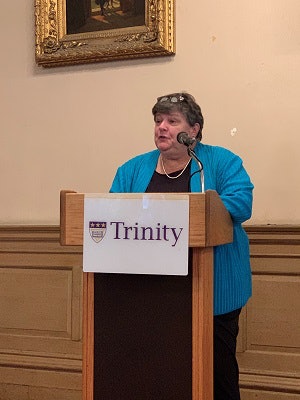When Patricia McGuire, president of Trinity Washington University, attended the school as an undergraduate, it was a predominantly White institution. Now, the Washington D.C. Catholic women’s college is about 65% Black and 30% Latina.
“Trinity is a model of change,” McGuire said. “We had to go through a deep, deep change process in order to become the institution we are today.”
 Trinity Washington University President Patricia McGuire
Trinity Washington University President Patricia McGuireNow, the school is pursuing further changes to serve its diverse student body. Last month, Trinity Washington University launched Trinity DARE: Driving Actions for Racial Equity, a five-pronged plan to address systemic inequalities as an institution.
The stated goals of the program include widening career pipelines, broadening access, employing inclusive excellence pedagogy and practices, conducting research and promoting education on racial inequities and engaging in a self-examination process as a university. Each goal encompasses a list of action items.
“I think this initiative can have a major impact, especially right now with everything being exposed, in terms of what some of us already knew, in terms of disparities by race and ethnicity,” said Dr. Cynthia Greer, an associate professor of counseling at Trinity Washington University whose research focuses on racial inequities in children’s mental health.
The inequalities laid bare by the COVID-19 pandemic and antiracist protests this summer weren’t a new discovery for a school like Trinity Washington. About 80% of full-time undergraduates are Pell Grant recipients, while students’ median family income hovers around $25,000 to $30,000 a year.
McGuire argued that to close national racial gaps, these are the students that need to be invested in, and that’s what Trinity DARE is ultimately about.
“There’s an awful lot of money right now being pledged to support racial equity,” she said. “You look and every major bank in the country has a racial equity program. Many foundations have it. A lot of that money right now is going to think tank type stuff and research. I’m making the case to those funding sources, they need to do direct help to students to help students complete degrees that will turn their economic fortunes around, in addition to giving them jobs.”
For McGuire, a major part of the new initiative is pursuing business relationships that lead to employment opportunities for her students. As a part of Trinity DARE, the university is seeking partnerships with corporations in which they donate $50,000, with each donation enabling five students to partake in industry-specific scholarships. Grants of $5,000 will also go toward Trinity DARE internships, providing stipends that can replace the hours students would normally need to work to support themselves through the summer. She hopes philanthropy and corporate partnerships will make these programs possible.
“What I know is one of the biggest barriers to racial equity for them is not being welcome or taken seriously by major employers,” McGuire said. “In my view, the action we need first and foremost is to be advocates for our students to get into the places where decisions get made. We know in this economy that … a lot of decisions get made in C-suites, in corporate positions, in managers’ offices, and I want Trinity students to be there.”
Trinity DARE will particularly focus on supporting students in industries where people of color have been historically underrepresented like nursing, science, technology, business management and journalism.
McGuire sees the tech sector as a particularly important frontier.
“Our Black and Hispanic students need to be part of the workforce pipeline for the major tech companies,” she said. “The tech companies have pretty shameful track records when it comes to hiring managerial and executive employees of color.”
She also highlighted the school’s plan to start the Trinity DARE Scholars Program, which would require $1,000,000 per year to help 100 students annually with grants of up to $10,000 to ideally eliminate their student loans.
“We make miracles happen every day, but these are students who really, really need not only tuition support, they need total cost of attendance support plus,” McGuire said.
For Greer, the goals of Trinity DARE – particularly its promise to focus on education about racial inequities – align with her research.
During the pandemic, she’s studying how COVID-19 impacts the mental health of children on top of the “preexisting condition” of racial trauma. She also spearheaded Trinity’s Initiative on Adverse Childhood Experiences and Trauma, which trains graduate students in the counseling program to respond to diverse children’s traumatic experiences, while forming partnerships with local organizations in the Washington, D.C. area so they too can incorporate the research into their work.
“You have to be able to understand the system to disrupt the system,” Greer said. Her research is conducted with the express goal of going outside “the ivory tower” to actively partner with the surrounding community. She wants to support not only current Trinity students but D.C. children, or the school’s “future students,” through racially-conscious, trauma-informed mental health resources. Trinity DARE will continue to support research like hers.
McGuire sees the new set of initiatives as a potential model for other institutions.
“I hope there will be many, many, millions more Black and Hispanic students who see a great college degree as achievable, accessible and necessary for them,” she said. “… We know that the best way to peace and prosperity and economic equality is education.”
Sara Weissman can be reached at [email protected].





















